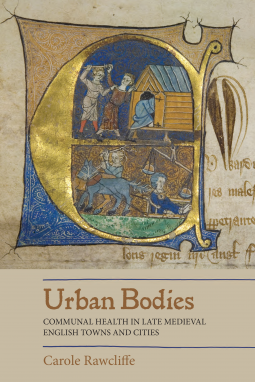
Urban Bodies: Communal Health in Late Medieval English Towns and Cities
by Carole Rawcliffe
This title was previously available on NetGalley and is now archived.
Buy on Amazon
Buy on BN.com
Buy on Bookshop.org
*This page contains affiliate links, so we may earn a small commission when you make a purchase through links on our site at no additional cost to you.
Send NetGalley books directly to your Kindle or Kindle app
1
To read on a Kindle or Kindle app, please add kindle@netgalley.com as an approved email address to receive files in your Amazon account. Click here for step-by-step instructions.
2
Also find your Kindle email address within your Amazon account, and enter it here.
Pub Date Oct 17 2013 | Archive Date Apr 10 2014
Boydell & Brewer | Boydell Press
Description
The idea of English medieval towns and cities as filthy, muddy and insanitary is here overturned in a pioneering new study.
Carole Rawcliffe continues with her mission to clean up the Middle Ages. In earlier work she has already given us scholarly yet sympathetic portrayals of English medicine, hospitals, and welfare for lepers. Now she widens her scope to public health. Her argument is clear, simple and convincing. Through the efforts of crown and civic authorities, mercantile élites and popular" interests, English towns and cities aspired to a far healthier, less polluted environment than previously supposed. All major sources of possible infection were regulated, from sounds and smells to corrupt matter - and to immorality. Once again Professor Rawcliffe has overturned a well-established orthodoxyin the history of pre-modern health and healing. Her book is a magnificent achievement." Peregrine Horden, Royal Holloway University of London.
This first full-length study of public health in pre-Reformation England challenges a number of entrenched assumptions about the insanitary nature of urban life during "the golden age of bacteria". Adopting an interdisciplinary approach that draws on material remains as well as archives, it examines themedical, cultural and religious contexts in which ideas about the welfare of the communal body developed. Far from demonstrating indifference, ignorance or mute acceptance in the face of repeated onslaughts of epidemic disease, the rulers and residents of English towns devised sophisticated and coherent strategies for the creation of a more salubrious environment; among the plethora of initiatives whose origins often predated the Black Death can also be found measures for the improvement of the water supply, for better food standards and for the care of the sick, both rich and poor.
CAROLE RAWCLIFFE is Professor of Medieval History, University of East Anglia.
Carole Rawcliffe continues with her mission to clean up the Middle Ages. In earlier work she has already given us scholarly yet sympathetic portrayals of English medicine, hospitals, and welfare for lepers. Now she widens her scope to public health. Her argument is clear, simple and convincing. Through the efforts of crown and civic authorities, mercantile élites and popular" interests, English towns and cities aspired to a far healthier, less polluted environment than previously supposed. All major sources of possible infection were regulated, from sounds and smells to corrupt matter - and to immorality. Once again Professor Rawcliffe has overturned a well-established orthodoxyin the history of pre-modern health and healing. Her book is a magnificent achievement." Peregrine Horden, Royal Holloway University of London.
This first full-length study of public health in pre-Reformation England challenges a number of entrenched assumptions about the insanitary nature of urban life during "the golden age of bacteria". Adopting an interdisciplinary approach that draws on material remains as well as archives, it examines themedical, cultural and religious contexts in which ideas about the welfare of the communal body developed. Far from demonstrating indifference, ignorance or mute acceptance in the face of repeated onslaughts of epidemic disease, the rulers and residents of English towns devised sophisticated and coherent strategies for the creation of a more salubrious environment; among the plethora of initiatives whose origins often predated the Black Death can also be found measures for the improvement of the water supply, for better food standards and for the care of the sick, both rich and poor.
CAROLE RAWCLIFFE is Professor of Medieval History, University of East Anglia.
Advance Praise
No Advance Praise Available
No Advance Praise Available
Marketing Plan
No Marketing Info Available
No Marketing Info Available
Available Editions
| EDITION | Other Format |
| ISBN | 9781843838364 |
| PRICE | $190.00 (USD) |



